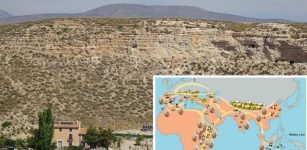Barbarians Were People Who Didn’t Speak Greek
Conny Waters - AncientPages.com - Who were the Barbarians? The term “Barbarians” is misused today. In modern times, we often say Barbarians are uncivilized people or evil people.
However, the true meaning of the word has been forgotten. The word originated in ancient Greece and initially referred to people who did not speak Greek.
A preconnesian marble depiction of a barbarian. Second century AD. Barbarian, so-called Dacian prisoner, Roman artwork. Image credit: Marie-Lan Nguyen - CC BY 2.5
Those of relatively advanced civilizations used the term to describe others considered less civilized. It referred to people from more primitive cultures who usually relied on physical strength more than intellect.
According to Strabo (64 BC - 21 CE), a Greek geographer and historian, people known as Carians, of all the “barbarians,” had a particular tendency to intermingle with the Greeks.
“This was particularly the case with the Carians, for, although the other peoples were not yet having very much intercourse with the Greeks nor even trying to live in Hellenic fashion or to learn our language ... yet the Carians roamed throughout the whole of Greece serving on expeditions for pay. ... and when they were driven thence [from the islands] into Asia, even here they were unable to live apart from the Greeks, I mean when the Ionians and Dorians later crossed over to Asia.” (Strabo 14.2.28)
Today, “barbarian” has another meaning and is used to describe someone using excessive violence without considering other options.
According to Konstantinos Vlassopoulos, a professor of Greek history at the University of Nottingham, the earliest attestation of the word barbarian in Greek literature is in Homer’s descriptions of the Carians as ‘barbarophonoi.’
Vlassopoulos notes that the ancient Greeks used this word in a confusing and contradictory fashion.
They had no agreement among the ancient Greeks regarding who spoke Greek and who didn’t, at least until Alexander the Great.
There “existed a variety of local and regional dialects, which were mutually comprehensible to a larger or smaller degree,” writes Vlassopoulos in his book “Greeks and the Barbarians.”
So, the original meaning of the word “barbarian” did not refer to acts of evil but to those who were not Greek or did not speak Greek. Also, who didn’t talk Greek was a matter of debate among the ancient Greeks.
Written by Conny Waters – AncientPages.com Staff Writer
Copyright © AncientPages.com All rights reserved. This material may not be published, broadcast, rewritten or redistributed in whole or part without the express written permission of AncientPages.com
Updated on January 18, 2023
Expand for referencesReferences:
Malcolm Heath. Review of Inventing the Barbarian, by Edith Hall. The Classical Review 41, no. 1 (1991): 90–92.
More From Ancient Pages
-
 Unsolved Mystery Of The Huldremose Woman: One Of The Best Preserved Bog Bodies Ever Found
Civilizations | Jan 9, 2017
Unsolved Mystery Of The Huldremose Woman: One Of The Best Preserved Bog Bodies Ever Found
Civilizations | Jan 9, 2017 -
 Strange Case Of The ‘Impossible’ Glove Remains Unexplained – The Investigation – Part 2
Featured Stories | May 28, 2019
Strange Case Of The ‘Impossible’ Glove Remains Unexplained – The Investigation – Part 2
Featured Stories | May 28, 2019 -
 Giant Balor Of The Evil Eye – Terrifying Fomorian King And Grandfather Of Celtic God Lugh
Celtic Mythology | Apr 30, 2018
Giant Balor Of The Evil Eye – Terrifying Fomorian King And Grandfather Of Celtic God Lugh
Celtic Mythology | Apr 30, 2018 -
 The Curse Fell On King Midas And His Gold Desire Became A Nightmare
Featured Stories | Feb 6, 2025
The Curse Fell On King Midas And His Gold Desire Became A Nightmare
Featured Stories | Feb 6, 2025 -
 Murder Of Archbishop Thomas Becket: One Of Most Famous Crimes Of Middle Ages
Featured Stories | Jan 6, 2017
Murder Of Archbishop Thomas Becket: One Of Most Famous Crimes Of Middle Ages
Featured Stories | Jan 6, 2017 -
 On This Day In History: Sweden Declares War On Its Ally The United Kingdom – On Nov 17, 1810
News | Nov 17, 2016
On This Day In History: Sweden Declares War On Its Ally The United Kingdom – On Nov 17, 1810
News | Nov 17, 2016 -
 Mysterious 2,000-Year-Old Disco Colgante – Unknown High-Tech Device, Representation Of A Spiral Galaxy Or Something Else?
Artifacts | Nov 20, 2020
Mysterious 2,000-Year-Old Disco Colgante – Unknown High-Tech Device, Representation Of A Spiral Galaxy Or Something Else?
Artifacts | Nov 20, 2020 -
 Did Ancient Romans And Greeks Love As We Do? Perhaps Even More Hopelessly
Featured Stories | Jul 30, 2024
Did Ancient Romans And Greeks Love As We Do? Perhaps Even More Hopelessly
Featured Stories | Jul 30, 2024 -
 Fire Reveals Notre-Dame De Paris Cathedral Was Historical First In Using Iron Reinforcements In The 12th Century
Archaeology | Mar 17, 2023
Fire Reveals Notre-Dame De Paris Cathedral Was Historical First In Using Iron Reinforcements In The 12th Century
Archaeology | Mar 17, 2023 -
 Supernatural Beliefs Have Featured In Every Society Throughout History: New Research Helps Explain Why
Featured Stories | Apr 5, 2023
Supernatural Beliefs Have Featured In Every Society Throughout History: New Research Helps Explain Why
Featured Stories | Apr 5, 2023 -
 Mystery Of The Unbreached Burial Chamber Inside A Little-Known Pyramid In The Dashur Complex
Featured Stories | Mar 18, 2022
Mystery Of The Unbreached Burial Chamber Inside A Little-Known Pyramid In The Dashur Complex
Featured Stories | Mar 18, 2022 -
 Mysterious Jomsvikings: Fearless Scandinavian Warrior-Brotherhood
Featured Stories | Apr 26, 2016
Mysterious Jomsvikings: Fearless Scandinavian Warrior-Brotherhood
Featured Stories | Apr 26, 2016 -
 Ancient DNA Reveals Bronze Age Women Altered Genetic Landscape Of Orkney
Archaeology | Feb 7, 2022
Ancient DNA Reveals Bronze Age Women Altered Genetic Landscape Of Orkney
Archaeology | Feb 7, 2022 -
 Evidence Of Europe’s Earliest Human Presence, Dating Back 1. 3 Million Years Found At Venta Micena, Iberian Peninsula
Evolution | Jul 13, 2024
Evidence Of Europe’s Earliest Human Presence, Dating Back 1. 3 Million Years Found At Venta Micena, Iberian Peninsula
Evolution | Jul 13, 2024 -
 Did The Dogon Tribe Have Knowledge Of Theoretical Physics 5,000 Years Ago?
Ancient Mysteries | Aug 2, 2017
Did The Dogon Tribe Have Knowledge Of Theoretical Physics 5,000 Years Ago?
Ancient Mysteries | Aug 2, 2017 -
 4,000-Year-Old Tomb Altóir Na Gréine Rediscovered By Folklorist In County Kerry, Ireland
Archaeology | Jan 24, 2024
4,000-Year-Old Tomb Altóir Na Gréine Rediscovered By Folklorist In County Kerry, Ireland
Archaeology | Jan 24, 2024 -
 What Is The History Of Pancakes?
Ancient History Facts | Mar 7, 2024
What Is The History Of Pancakes?
Ancient History Facts | Mar 7, 2024 -
 Posca: ‘Wine Of The People’ Was Popular In Ancient Rome And Greece
Ancient History Facts | Sep 26, 2018
Posca: ‘Wine Of The People’ Was Popular In Ancient Rome And Greece
Ancient History Facts | Sep 26, 2018 -
 Daily Life Of Ancient Maya
Ancient History Facts | Oct 12, 2020
Daily Life Of Ancient Maya
Ancient History Facts | Oct 12, 2020 -
 Enigmatic Underground Iron Age Monument At Navan Fort And Its Connection To The Ulster Kings Investigated
Archaeology | Aug 24, 2023
Enigmatic Underground Iron Age Monument At Navan Fort And Its Connection To The Ulster Kings Investigated
Archaeology | Aug 24, 2023

